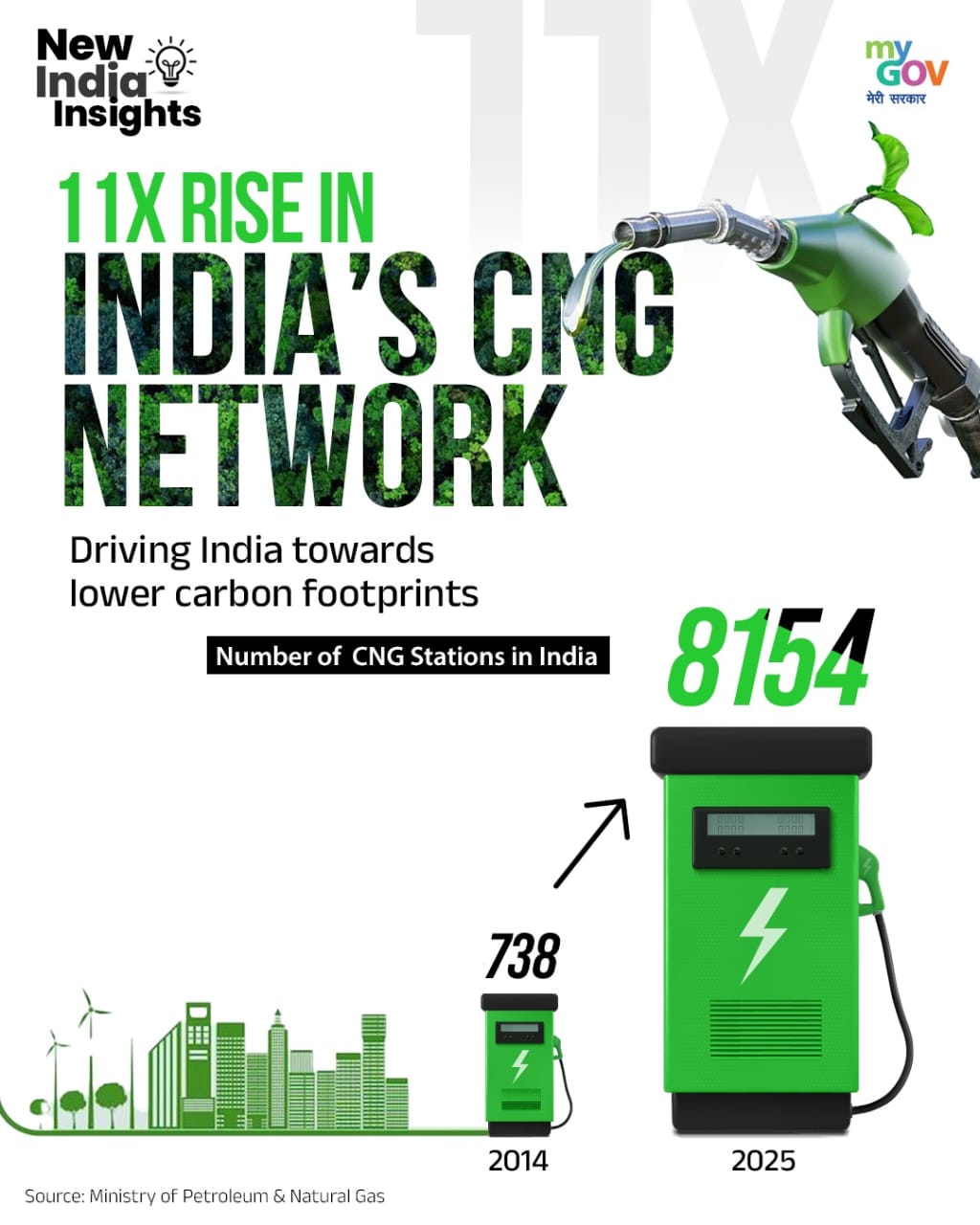
India’s CNG Story: A Clean Energy Revolution & What It Means for Investors
The past decade has marked a dramatic shift in India’s energy landscape. From a modest 738 CNG (Compressed Natural Gas) stations in 2014 to a staggering 8,154 in 2025, India’s CNG infrastructure has grown elevenfold. This transformation is not just a statistic—it’s a testament to the country’s commitment toward clean energy, sustainability, and a future less reliant on conventional fossil fuels.
How is the CNG Boom Impacting the Sector?
The expansion of India’s CNG network is revolutionizing the transportation and energy sectors:
- Reduced Carbon Footprint: CNG is significantly cleaner than diesel or petrol, leading to lower greenhouse gas emissions and improved urban air quality.
- Fuel Diversification: The rapid adoption of CNG reduces dependence on imported crude oil, improving energy security and trade balance.
- Sectoral Uptake: From auto-rickshaws in cities to long-haul trucks on highways, CNG adoption permeates both passenger and commercial transport, with state governments incentivizing further conversion.
Impact on Companies
This incredible growth directly benefits several key industries and listed companies:
1. Energy and Gas Distribution Companies
- GAIL (India) Ltd.: India’s largest natural gas company, a major force in CNG pipeline and distribution expansion.
- Indraprastha Gas Limited (IGL): Delhi-NCR’s leading CNG supplier, rapidly expanding its network.
- Mahanagar Gas Limited (MGL): A dominant player in Mumbai’s CNG distribution.
- Gujarat Gas Ltd.: The country’s largest city gas distribution company by sales volume and network.
- Adani Total Gas Ltd.: A significant player in pan-India city gas distribution, investing heavily in CNG stations.
- Petronet LNG, ONGC, Oil India Ltd., Reliance Industries Ltd. (indirectly via natural gas production/supply).
2. Automobile Manufacturers
- Maruti Suzuki India Ltd.: India’s largest automaker, leading in CNG car sales across compact and hatchback segments.
- Tata Motors Ltd.: Strong CNG portfolio in both commercial vehicles (trucks, buses) and passenger cars.
- Mahindra & Mahindra Ltd.: Expanding CNG options in small commercial vehicles.
- Ashok Leyland Ltd. and Eicher Motors: Offer CNG variants in their commercial fleets.
- Bajaj Auto: Provides CNG-compatible three-wheelers for urban transport.
3. Equipment, Ancillary & Technology Companies
- Everest Kanto Cylinder Ltd.: Market leader in high-pressure gas cylinders required for CNG vehicles.
- Supreme Industries, Time Technoplast: Supply CNG gas cylinders/related infrastructure.
- Greaves Cotton Ltd.: Supplies kits & conversion technology for retrofitting existing vehicles.
- Automobile conversion & service firms: Serve the fast-growing after-sales/maintenance market for CNG kit upgradation.
Long-Term Goals Driving Growth
- Net Zero Emissions: India is committed to ambitious climate goals, including achieving net zero by 2070. CNG acts as a vital transition fuel in this journey.
- Lower Urban Pollution: Cleaner transportation options lead to significant health benefits in India’s densely populated cities.
- Scalable Infrastructure: Using existing natural gas networks lays a foundation for eventual transition to renewables and hydrogen fuels.
Positive Impacts
- Investor Confidence: Consistent policy support and rising adoption give investors a clear, visible growth trajectory.
- Job Creation: Construction, operation, and maintenance of CNG stations support thousands of jobs nationwide.
- Consumer Savings: CNG vehicles provide lower running costs versus petrol or diesel alternatives.
- Broader Market Participation: Growth benefits not just fuel distributors, but also vehicle makers, equipment manufacturers, and the allied service sector.
Potential Challenges and Negatives
- Infrastructure Bottlenecks: Some remote or rural regions still lack last-mile connectivity for CNG distribution.
- Supply Chain and Pricing: Volatility in natural gas prices and the long-term viability of government subsidies remain areas of concern.
- Technology Gaps: Not all vehicle segments adapt easily to CNG, limiting immediate adoption in certain markets.
Key Listed Companies Benefiting from CNG Growth
City Gas Distribution
- GAIL, IGL, MGL, Gujarat Gas, Adani Total Gas, Petronet LNG, ONGC, Oil India, Reliance Industries (gas division)
Automobile Manufacturing
- Maruti Suzuki, Tata Motors, Mahindra & Mahindra, Ashok Leyland, Eicher Motors, Bajaj Auto
Ancillary, Technology & Equipment
- Everest Kanto Cylinder, Greaves Cotton, Supreme Industries, Time Technoplast
Disclaimer
This blog is for informational purposes only and does not constitute investment advice. Investors should conduct their own due diligence and consult with a financial advisor before making investment decisions based on the information provided.
Conclusion
India stands at the forefront of a clean energy revolution with its exponential CNG growth. This expansion not only promises a sustainable and profitable future for investors but also aligns with the nation’s climate ambitions. As new policies and technologies emerge, staying updated and identifying early-mover opportunities in the CNG ecosystem—and among the listed companies driving this change—could unlock significant long-term value.



 for Investors The provided chart outlines key metrics for Nifty 500 companies across different periods (FY22 t.png)





